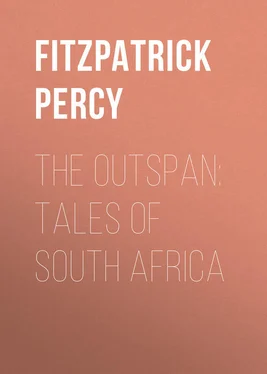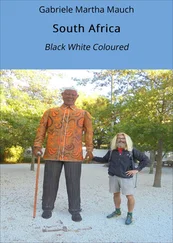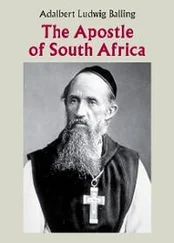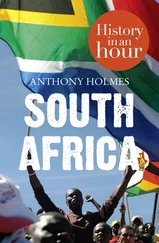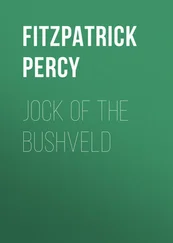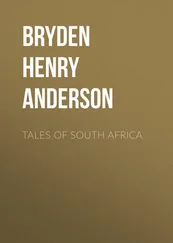Percy Fitzpatrick - The Outspan - Tales of South Africa
Здесь есть возможность читать онлайн «Percy Fitzpatrick - The Outspan - Tales of South Africa» — ознакомительный отрывок электронной книги совершенно бесплатно, а после прочтения отрывка купить полную версию. В некоторых случаях можно слушать аудио, скачать через торрент в формате fb2 и присутствует краткое содержание. Жанр: foreign_antique, foreign_prose, short_story, на английском языке. Описание произведения, (предисловие) а так же отзывы посетителей доступны на портале библиотеки ЛибКат.
- Название:The Outspan: Tales of South Africa
- Автор:
- Жанр:
- Год:неизвестен
- ISBN:нет данных
- Рейтинг книги:3 / 5. Голосов: 1
-
Избранное:Добавить в избранное
- Отзывы:
-
Ваша оценка:
- 60
- 1
- 2
- 3
- 4
- 5
The Outspan: Tales of South Africa: краткое содержание, описание и аннотация
Предлагаем к чтению аннотацию, описание, краткое содержание или предисловие (зависит от того, что написал сам автор книги «The Outspan: Tales of South Africa»). Если вы не нашли необходимую информацию о книге — напишите в комментариях, мы постараемся отыскать её.
The Outspan: Tales of South Africa — читать онлайн ознакомительный отрывок
Ниже представлен текст книги, разбитый по страницам. Система сохранения места последней прочитанной страницы, позволяет с удобством читать онлайн бесплатно книгу «The Outspan: Tales of South Africa», без необходимости каждый раз заново искать на чём Вы остановились. Поставьте закладку, и сможете в любой момент перейти на страницу, на которой закончили чтение.
Интервал:
Закладка:
As he turned, he pointed with his foot to the fire, growling out that there was a billy of tea and some stew warmed up “for him” (looking back at Soltké), and adding, “Bread’s in the grub-box. ’Night!” he turned in.
It was just like him to remember these things, for in our routine there was as a rule no eating during the night outspan. It was breakfast after the morning trek, and supper before the evening one. Gowan had also thrown out a couple of blankets, and between us we made up pretty well for the lost bedding; so Soltké was installed as one of the party. It says something for him that, in spite of our eight-mile walk and that yellow portmanteau, the verdict under our waggons that night was: “Seems a decent sort, after all, and it would ha’ been a bit rough to leave him to shift for himself.”
Soltké’s stupendous greenness should have disarmed chaff; and, indeed, at first we all felt that fooling him was like misleading a child: there was no fun to be got out of it. He believed anything that was told him. He accepted literally those palpable exaggerations which are not expected or wanted to be believed. He took for gospel the account of the Munchausen of the Bush veld who told how his team of donkeys had been disturbed by a lion during the early morning trek, and how, to his infinite surprise and alarm, he found that the savage brute had actually eaten his way into one donkey’s place, and when day broke was found still pulling in the team, to the great dismay of the other members. He was anxious to make a personal experiment of the efficacy of dew taken off a bullock’s horn, which we had recommended as an infallible snake charm. At considerable risk he had secured the dew, and the scene of Soltké’s struggling with the bewildered bullock at early dawn one morning was one to be remembered. However, he pledged himself not to carry the experiment further without the assistance of one of us, and a day or two later we removed immediate risk by losing his phial of dew. I am convinced that he would have tried the experiment on any snake he might have met, and with absolute confidence as to the result.
His mind was such as one would expect in a child who had known neither mental nor physical fear. He seemed absolutely void, not only of personal knowledge of evil, but even of that cognisance of its existence which shows itself in a disposition to seek corroborative evidence, to consult probabilities, and to inquire into motives. I am convinced that Soltké never questioned a motive in his life, nor ever hesitated to accept as a fact anything told in apparent seriousness. Irony and sarcasm were to him as to a child or a savage. He was intensely literal, single-minded and direct, and perfectly fearless in thought, word or act. Such a disposition in a child would have been charming. In a well-set-up, active young man of three-and-twenty or so it was embarrassing. Donald Mackay, who was of a choleric disposition, complained a day or two after Soltké joined us that “he was blanked if he could blank well stand it. Why, that morning, when he was about to give one o’ the boys a lambastin’, the kiddie turns white as a girl wi’ the first swear and a sight of the sjambok, an’ Aa tell ye, mon, Aa was nigh to bustin’ wi’ a’ the drawing-room blether Aa was gettin’ off.” It was quite true. Soltké was not shocked nor affecting to be shocked at the vigorous language he heard; he was simply unlearned in it, and shrank as a girl might from the outburst of violence.
Gradually the feeling of strangeness wore off, and the restraint which the new presence had imposed was no longer felt except on odd occasions. On our side, we chaffed and shook him up, partly on the impulse of the time, and partly with good-natured intent to make him better fitted to take care of himself among the crowd with whom he would mix later on. On his side, he had never felt restraint, and of course rapidly became familiar with us and our ways, and seemed thoroughly to enjoy the chaff and his initiation into the system of good-humoured imposture. With all his greenness, he was no fool; in fact, he was in odd, unexpected ways remarkably shrewd and quick, as he often showed in conversation. He was, moreover, a poor subject for practical jokes, and several of the stock kind recoiled on the perpetrators, because, as I have said, he did not know what fear was.
When a notorious practical joker named Evans, with whom we travelled in company for a couple of days, “put up” the lion scare on Soltké, it didn’t come off. He asked our young friend to dine at his waggons on the other side of a dry donga, and, after telling the most thrilling lion yarns all the evening, left Soltké to walk back alone, while he slipped off to waylay him at the darkest and deepest part of the donga. There was the rustle of bushes and sudden roar which had so often played havoc before; but Soltké only stepped back, and lugged out in unfamiliar fashion a long revolver which no one knew he carried. Ignoring the fact that a lion could have half eaten him in the time expended, Soltké calmly cocked the weapon, and, to the terror of his late host, poured all six barrels into the bush from which the noise had come. He then retreated quietly out of the donga to where we, hearing the shots and Evans’s shouts of terror, had run down to see what was up. Soltké was excited, but quiet, and the noise of the reports had evidently prevented him from detecting the man’s voice. He said:
“It was something what make ‘Har-r-r-!’ by me, and I shoot; but I haf no more cartridge.”
We did not see Evans again for some months. The story of Soltké’s lion made the road too hot for him that winter.
When we told Soltké the real facts, his face was a study. For some days he was very quiet and thoughtful; he was completely puzzled, and for the life of him could not imagine the motive that had actuated Evans; nor could he, on the other hand, realise the possibility of anyone acting differently from the way in which he had done.
Before this there had been some horseplay when we were crossing the Komatie River. The stream was running strong, and was then from four to five feet deep at the drift; and, although it was known to be full of crocodiles, there was little or no danger at the regular crossing. However, Key had primed Soltké with some gorgeous stories of hairbreadth escapes, intending to play a trick on him in the river.
“It is quite a common thing for men to be carried off here,” said the Judge; “but white men are very seldom killed – not more than four or five a year – because of the boots.”
“Boots!” exclaimed Soltké inquisitively.
“Yes,” said Key, in half-absent tones. “Ef you kick properly, no croc’ can stand it.”
Soltké complained excitedly, and as though he had suffered gross injustice, that no one had told him this interesting phase of life on the road; but Key snubbed him, telling him that men didn’t speak much of such matters, as it gave the impression of bragging.
Soltké, who was above all things desirous of conforming with the etiquette of the road, asked no more questions; but Key, later on in the day, affecting to relent a little, got Soltké to sit straddle-legs on the pole of one of the waggons, and there, under his directions, practise kicking crocodiles.
The crossing was too difficult for one span of oxen, so we double-spanned, and put all hands on with whips and sjamboks along the thirty oxen, to whack and shout until we got through.
Key placed himself behind Soltké and, just when the excitement was greatest, with his long whip-stick and lash he made a loop, in which he managed to enclose Soltké’s legs. One jerk took him clean off his feet, and down-stream he went, floundering and kicking for dear life, for he believed a crocodile had him. His kicking when he was head downwards and his legs were free of the water was remarkable. There were roars of laughter from everyone, as Key had passed the word along; but presently there was a lull, and the niggers stopped laughing and felt the joke fall flat, when Soltké, utterly unconscious of the real cause of his upset, waded deliberately back as soon as he recovered his feet, and, pale but undaunted, took his place, sjambok in hand, the same as before.
Читать дальшеИнтервал:
Закладка:
Похожие книги на «The Outspan: Tales of South Africa»
Представляем Вашему вниманию похожие книги на «The Outspan: Tales of South Africa» списком для выбора. Мы отобрали схожую по названию и смыслу литературу в надежде предоставить читателям больше вариантов отыскать новые, интересные, ещё непрочитанные произведения.
Обсуждение, отзывы о книге «The Outspan: Tales of South Africa» и просто собственные мнения читателей. Оставьте ваши комментарии, напишите, что Вы думаете о произведении, его смысле или главных героях. Укажите что конкретно понравилось, а что нет, и почему Вы так считаете.
